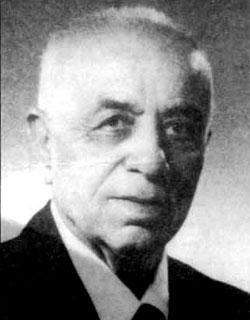
Hossein Gol-e-Golab
Encyclopedia


Persian language
Persian is an Iranian language within the Indo-Iranian branch of the Indo-European languages. It is primarily spoken in Iran, Afghanistan, Tajikistan and countries which historically came under Persian influence...
حسین گل گلاب also given as Hosayn Golgolab, (1895 - March 12, 1984) was a polymath
Polymath
A polymath is a person whose expertise spans a significant number of different subject areas. In less formal terms, a polymath may simply be someone who is very knowledgeable...
Iran
Iran
Iran , officially the Islamic Republic of Iran , is a country in Southern and Western Asia. The name "Iran" has been in use natively since the Sassanian era and came into use internationally in 1935, before which the country was known to the Western world as Persia...
ian scholar and musician who wrote the nationalist anthem Ey Iran
Ey Iran
Ey Iran is a famous and popular anthem in Iran. The lyrics were written by Hossein Gol-e-Golab in 1946, the music was composed by Ruhollah Khaleghi, and it was first performed by Gholam Hossein Banan....
.
Gol-e-Golab was born in Kerman, and studied at the Elmiya School and Darolfonoon. He learned to play both the setar
Setar
SETAR N.V., is the privatised full telecommunications service provider for the island of Aruba. The services provided by SETAR include: telephone, internet and GSM-related wireless services. SETAR also owns Tele Aruba....
and tar
Tar
Tar is modified pitch produced primarily from the wood and roots of pine by destructive distillation under pyrolysis. Production and trade in tar was a major contributor in the economies of Northern Europe and Colonial America. Its main use was in preserving wooden vessels against rot. The largest...
as a boy. He taught at Dar al-Fonun and later enrolled at the law school there, earning degrees in law and political science in 1922. However, he displayed a great talent for the natural science
Natural science
The natural sciences are branches of science that seek to elucidate the rules that govern the natural world by using empirical and scientific methods...
s, especially botany
Botany
Botany, plant science, or plant biology is a branch of biology that involves the scientific study of plant life. Traditionally, botany also included the study of fungi, algae and viruses...
, and in 1928 was tenured at the school of medicine. This later became the Faculty of Medicine at the emerging University of Tehran
University of Tehran
The University of Tehran , also known as Tehran University and UT, is Iran's oldest university. Located in Tehran, the university is among the most prestigious in the country, and is consistently selected as the first choice of many applicants in the annual nationwide entrance exam for top Iranian...
.
Gol-e-Golab never lost his interest in music, finding time to translate Western operas into his native Persian while teaching and writing on botany and serving on the Academy of Persian Language and Literature
Academy of Persian Language and Literature
Iran's Academy of Persian Language and Literature is a body controlled by the Iranian government presiding over the use of the Persian language in Iran and other Persian speaking countries. The academy members are academics of Persian literature and linguistics from , , , and .- History :The...
, to which he was appointed 1935.
In 1944, after witnessing an ugly incident where an American soldier serving on the Persian Corridor
Persian Corridor
The Persian Corridor is the name for a supply route through Iran into Soviet Azerbaijan by which British aid and American Lend-Lease supplies were transferred to the Soviet Union during World War II.-Background:...
beat up a native Iranian greengrocer, Gol-e-Golab composed the poem Ey Iran
Ey Iran
Ey Iran is a famous and popular anthem in Iran. The lyrics were written by Hossein Gol-e-Golab in 1946, the music was composed by Ruhollah Khaleghi, and it was first performed by Gholam Hossein Banan....
, which was set to music by Rouhollah Khaleghi and soon be came a de facto Iranian national anthem.

